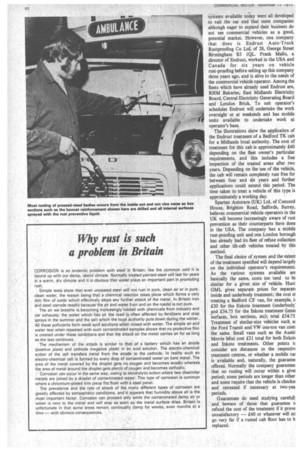Why rust is such a problem in Britain
Page 86

If you've noticed an error in this article please click here to report it so we can fix it.
CORROSION is an endemic problem with steel in Britain; like the common cold it is bound up with our damp, island climate. Normally treated painted-steel will last for years in a warm, dry climate and it is obvious that water plays an important part in promoting rust.
Simple tests show that even uncoated steel will not rust in pure, clean air or in pure, clean water, the reason being that a chemical reaction takes place which forms a very thin film of oxide which effectively stops any further attack of the metal. In Britain iron and steel corrode readily because the air and water (rain and on the roads) is not pure.
The air we breathe is becoming increasingly loaded with chemicals from industry and car exhausts: the water which lies on the road is often affected by fertilizers and crop sprays in the summer and the salt which the local authority puts down during the winter. All these pollutants form weak acid solutions when mixed with water. The simple air and water test when repeated with such contaminated samples shows that no protective film is created under these conditions and that the attack on the metal carries on for as long as the test continues.
The mechanism of the attack is similar to that of a battery which has an anode (positive plate) and cathode (negative plate) in an acid solution. The electro-chemical action of the cell transfers metal from the anode to the cathode. In reality such an electro-chemical cell is formed by every drop of contaminated water on bare metal. The area of the metal covered by the droplet gets no oxygen and becomes anodic whereas the area of metal around the droplet gets plenty of oxygen and becomes cathodic.
Corrosion can occur in the same way, owing to electrolytic action where two dissimilar metals are joined by a droplet of contaminated water. This type of corrosion is common where a chromium-plated trim piece fits flush with a steel panel.
The prevalence and the rate of attack of the many different types of corrosion are greatly affected by atmospheric conditions, and it appears that humidity above all is the most important factor. Corrosion can proceed only while the contaminated damp air or water is next to the metal and will stop as soon as the metal surface dries. Britain is unfortunate in that some areas remain continually damp for weeks, even months at a tima — with obvious consequences.
































































































































































